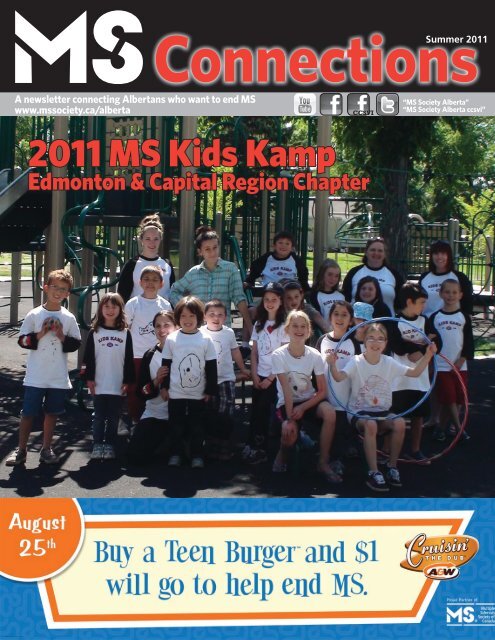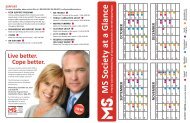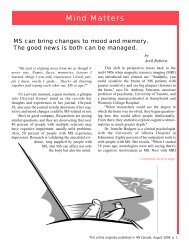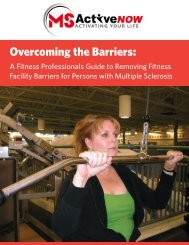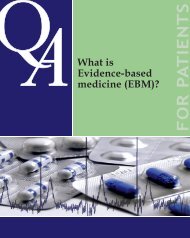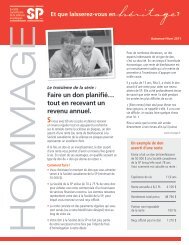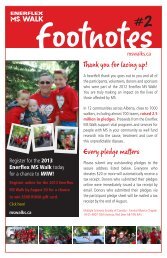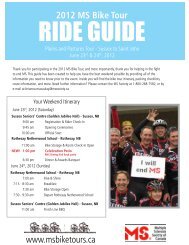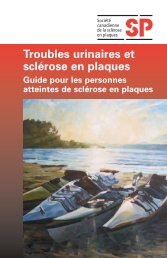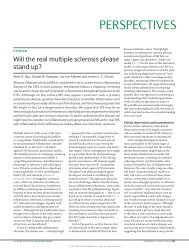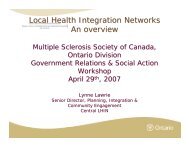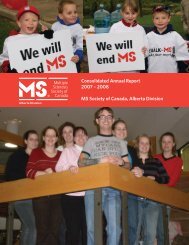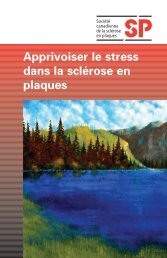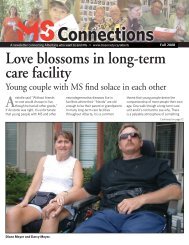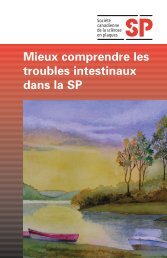Summer 2011 - Multiple Sclerosis Society of Canada
Summer 2011 - Multiple Sclerosis Society of Canada
Summer 2011 - Multiple Sclerosis Society of Canada
You also want an ePaper? Increase the reach of your titles
YUMPU automatically turns print PDFs into web optimized ePapers that Google loves.
A newsletter connecting Albertans who want to end MS<br />
www.mssociety.ca/alberta<br />
Connections<br />
<strong>Summer</strong> <strong>2011</strong><br />
<strong>2011</strong> MS Kids Kamp<br />
Edmonton & Capital Region Chapter<br />
“MS <strong>Society</strong> Alberta”<br />
“MS <strong>Society</strong> Alberta ccsvi”<br />
Join us on Facebook at: Cruisin for a Cause
MS Connections is published quarterly by the<br />
MS <strong>Society</strong> <strong>of</strong> <strong>Canada</strong>, Alberta & Northwest<br />
Territories Division. It is intended to provide<br />
news and information for Albertans with<br />
MS, their families, caregivers, medical<br />
pr<strong>of</strong>essionals and other stakeholders. The<br />
information and opinions contained in<br />
this newsletter are obtained from sources<br />
believed to be reliable, but their accuracy<br />
cannot be guaranteed. We value your<br />
comments, feedback and reprint requests—<br />
please email them to info.alberta@mssociety.<br />
ca or call us at the numbers listed below.<br />
MS <strong>Society</strong> <strong>of</strong> <strong>Canada</strong><br />
Alberta & Northwest Territories Division<br />
Managing Editor, Darrel Gregory<br />
darrel.gregory@mssociety.ca<br />
Editor, Angie Mah<br />
angie.mah@mssociety.ca<br />
<strong>2011</strong><br />
Board <strong>of</strong> Directors<br />
Chair: James Orr<br />
1st Vice Chair: Carey Mogdan<br />
2nd Vice Chair: Kevin O’Neil<br />
Treasurer: Gayelene Bonenfant<br />
Secretary: Joan Ozirny<br />
MEMBERS-AT-LARGE<br />
Phil Clarke<br />
Hazel Flewwelling<br />
Melanee Framp<br />
Darrel Frisken<br />
Wayne Jacques<br />
Jason Kaye<br />
Lynne Sangster<br />
Doreen Saunderson<br />
Jessica Williams<br />
HONOURARY DIRECTOR (Non-voting)<br />
Judy Gordon<br />
Our Mission<br />
To be a leader in finding a<br />
cure for multiple sclerosis and<br />
enabling people affected by MS<br />
to enhance their quality <strong>of</strong> life.<br />
Contact Us<br />
#150, 9405 - 50 Street<br />
Edmonton, Alberta T6B 2T4<br />
Phone: (780) 463-1190<br />
Toll-free: 1-800-268-7582<br />
Fax: (780) 479-1001<br />
Email: info.alberta@mssociety.ca<br />
www.mssociety.ca/alberta<br />
2 MS Connections <strong>Summer</strong> <strong>2011</strong><br />
Declining Walk revenues<br />
present challenge<br />
MS Bike Tours remain strong<br />
I<br />
wish to take this opportunity to<br />
acknowledge and thank the thousands<br />
<strong>of</strong> event participants and volunteers<br />
throughout Alberta who came out this year to<br />
support the 12 Enerflex MS Walks and three<br />
RONA MS Bike Tours in the spring. Feedback<br />
from participants was extremely positive.<br />
Proceeds raised from the walks and bike tours<br />
represent the majority <strong>of</strong> our revenue which<br />
we use to provide programs and services for<br />
Albertans living with MS. The two largest bike tours, Leduc to Camrose and Airdrie to<br />
Olds, did extremely well and are likely to exceed the amount that was raised last year.<br />
The walks, on the other hand, experienced a fairly significant decline in participants<br />
and money raised. Judging from what we<br />
know about the charitable giving sector<br />
in general, this should not have come<br />
as such a big surprise, given the slow<br />
economic recovery, competition with<br />
other events, and other factors that are<br />
less apparent.<br />
The decline in walk revenues is <strong>of</strong><br />
concern because, in general, most <strong>of</strong> the<br />
participants have a direct connection<br />
to MS and therefore have the most at<br />
stake. Their close connection to the<br />
disease means that they are impacted,<br />
either directly or indirectly, by the level <strong>of</strong><br />
services we are able to provide and the<br />
number <strong>of</strong> MS research projects we are<br />
able to fund.<br />
“Their close<br />
connection to the<br />
disease means<br />
that they are<br />
impacted...by the<br />
level <strong>of</strong> services<br />
we are able to<br />
provide....”<br />
I welcome your comments and opinions which can help us make changes to the walks<br />
in order to increase participation and revenue. It’s important that we get a handle<br />
on this so we can recover the decline in revenues next year that affect our ability to<br />
advance the MS cause in Alberta and across the country. To do this, we will need<br />
everyone’s help.<br />
Neil Pierce<br />
President<br />
Alberta & Northwest Territories Division
MS Friendly Visiting program<br />
provides vital outreach<br />
The MS Friendly Visiting program provides informal support for persons with<br />
MS who live in continuing care. The program provides support, awareness <strong>of</strong><br />
community resources, shared activities, and in some cases a means <strong>of</strong> respite<br />
care for caregivers <strong>of</strong> persons with MS.<br />
Larissa (right) and Mary share a<br />
conversation during a recent visit. Mary<br />
is a resident at CapitalCare Dickinsfield in<br />
Edmonton.<br />
“Larissa has been part <strong>of</strong> my life for about a<br />
year and a half. She is invaluable to me, and<br />
the time that I spend with her is precious. I<br />
can’t read anymore, so she’s my eyes, and<br />
she fully comes through for me. I think we’ve<br />
become pretty good friends. It’s just precious,<br />
precious time.” - Mary<br />
Erin Ferguson (right) visits Barb<br />
Imbrogno, a resident at Dr. Vernon<br />
Fanning Centre in Calgary.<br />
“I really look forward to my visits with<br />
Erin. It is always nice to hear her stories<br />
and keep updated on what she has been<br />
up to.” - Barb<br />
Kristin Munro (left) visits Fay<br />
Wallace, a resident at Dr. Vernon Fanning<br />
Centre in Calgary.<br />
“The program has been a very rewarding<br />
experience. It has been great to get to<br />
know Fay and I really think we learn a lot<br />
from each other.” - Kristin<br />
“Kristin is very nice and kind and I<br />
always look forward to seeing her.” - Fay<br />
MS Connections <strong>Summer</strong> <strong>2011</strong> 3
A rtists’ Corner<br />
Ambassador turns to<br />
poetry for self-expression<br />
Jessi Fairhurst from Brooks is a long-time Ambassador with the MS<br />
<strong>Society</strong>. She has written poetry on and <strong>of</strong>f over the years and has<br />
recently delved into her creativity to produce a new poem. Jessi was<br />
diagnosed with MS in 2002. In this poem, “I Miss You,” she speaks to<br />
how she sometimes misses the person she was before MS came into<br />
her life.<br />
I Miss You<br />
By Jessi Fairhurst<br />
I miss you<br />
I miss the you that was carefree<br />
I miss the you that didn’t wake with pain and exhaustion<br />
I miss the you that didn’t have to pretend that you’re “fine”<br />
I miss the you that wasn’t helpless<br />
I miss the you that didn’t have to struggle against your own body and brain<br />
I miss the you that wasn’t in a constant battle with depression<br />
I miss the you that didn’t wonder what the point was<br />
I miss the you that has lost so much without even getting it first<br />
I miss the you that doesn’t have to suffer so much grief<br />
I miss the you that was me.<br />
4 MS Connections <strong>Summer</strong> <strong>2011</strong><br />
MS fundraising<br />
results across<br />
the province<br />
(as <strong>of</strong> July 14, <strong>2011</strong>)<br />
<strong>2011</strong> RONA<br />
MS Bike Tours<br />
Leduc to Camrose<br />
$1.8 million<br />
Airdrie to Olds • $714,000<br />
Central (Red Deer) • $107,000<br />
<strong>2011</strong><br />
Enerflex MS Walks<br />
Edmonton<br />
St. Albert<br />
Drumheller<br />
Grande Prairie<br />
Lloydminster<br />
Calgary<br />
Red Deer<br />
Lethbridge<br />
Brooks<br />
Medicine Hat<br />
Fort McMurray<br />
St. Paul<br />
$670 000<br />
$136 000<br />
$38 000<br />
$52 000<br />
$115 000<br />
$717 000<br />
$162 000<br />
$150 000<br />
$19 300<br />
$71 500<br />
$16 500<br />
$177 000<br />
North Peace Trail Ride<br />
40 Riders • $31,708<br />
$218,000
During the weekend <strong>of</strong> June 3-5, 19 teens from around the province got together for the 10th Annual MS<br />
Teen Escape held at Gull Lake, near Red Deer. It was a chance for teens affected by MS to participate in fun<br />
educational and recreational activities, and mingle with new and old friends alike.<br />
“ “ new people.” - Haley<br />
“<br />
“<br />
What I really like about Teen Escape<br />
is the support. It really helps to open up<br />
and be around people who go through the same<br />
thing as you do. You have people at school and<br />
people in your everyday life, and sometimes they<br />
don’t really understand what it’s like to have a<br />
parent with MS and how hard it can be. I really like<br />
coming here because we all have that in common.<br />
We meet people here and most <strong>of</strong> the time we stay<br />
in touch and talk throughout the year.” - Bria<br />
What I like about Teen Escape is the fun<br />
activities, the food and how nice all the<br />
people are.” - Cody<br />
MS<br />
Teen eScape<br />
Fun, friends and support<br />
I love coming to MS Teen Escape<br />
because <strong>of</strong> all the activities we do and<br />
we get to learn about MS without it being a<br />
boring classroom scenario and you get to meet<br />
I really like it because <strong>of</strong> the support<br />
and all the friends you meet because<br />
you do stay in touch with them all year and you<br />
can talk to them whenever you want.”<br />
- Stephanie<br />
MS Connections <strong>Summer</strong> <strong>2011</strong> 5
Alberta CCSVI study seeks<br />
volunteers<br />
A highly-anticipated Alberta MS observational study ready to enrol volunteer<br />
participants<br />
The Alberta <strong>Multiple</strong> <strong>Sclerosis</strong><br />
Initiative (TAMSI) is a 3-year<br />
study for people with MS and<br />
related conditions, initially<br />
focussing on those who have sought<br />
interventions for chronic cerebrospinal<br />
insufficiency (CCSVI).. The $1 million<br />
funding for the study was announced in<br />
December 2010 by Gene Zwozdesky,<br />
Minister <strong>of</strong> Health and Wellness.<br />
The main immediate goal <strong>of</strong> the<br />
TAMSI study is to determine the safety<br />
and patient- reported impact <strong>of</strong> the<br />
various types <strong>of</strong> treatments which<br />
have commonly become known as the<br />
“Zamboni treatment” from Albertans<br />
who have had one <strong>of</strong> these types <strong>of</strong><br />
procedures.<br />
“In order to fully understand the<br />
benefits <strong>of</strong> treatment and possible<br />
complications <strong>of</strong> CCSVI as it relates to<br />
MS, we need the personal , first-hand<br />
accounts <strong>of</strong> Albertans living with multiple<br />
sclerosis,” said Neil Pierce, President, MS<br />
<strong>Society</strong>, Alberta & NWT Division. “The<br />
TAMSI study will increase our ability to<br />
track people’s treatment experience and<br />
advance our knowledge. In fact, I recently<br />
heard Dr. Hubbard, a well-respected<br />
CCSVI proponent from California, affirm<br />
that we need to track the personal<br />
6 MS Connections <strong>Summer</strong> <strong>2011</strong><br />
testimonials <strong>of</strong> people who have received<br />
the treatment.”<br />
Dr. Luanne Metz, from the University<br />
<strong>of</strong> Calgary Hotchkiss Brain Institute, is<br />
the principal investigator on the TAMSI<br />
“Prospective<br />
volunteer<br />
participants can<br />
visit www.tamsi.ca for<br />
further information<br />
on the TAMSI<br />
study....”<br />
study. Dr. Metz is leading a diverse team<br />
<strong>of</strong> researchers from the University <strong>of</strong><br />
Calgary and University <strong>of</strong> Alberta, in<br />
collaboration with other MS experts from<br />
a broad range <strong>of</strong> backgrounds.<br />
“All Albertans with MS, regardless<br />
<strong>of</strong> their treatment plans or experiences<br />
with CCSVI interventions, are being<br />
encouraged to take part,” said Dr. Metz.<br />
“A wide spectrum <strong>of</strong> MS patients is<br />
required in order to adequately compare<br />
and evaluate the impacts <strong>of</strong> the various<br />
‘Zamboni treatments.’”<br />
In addition to MS patients, Albertans<br />
with suspected MS, optic neuritis,<br />
transverse myelitis, Devic’s neuromyelitis<br />
optica, or a clinically isolated syndrome<br />
(CIS) will also be invited to participate in<br />
the TAMSI study.<br />
The TAMSI study will look at the<br />
safety and patient-reported impact <strong>of</strong> the<br />
range <strong>of</strong> CCSVI interventions including<br />
angioplasty and venous stents, as well as<br />
prescribed aftercare plans.<br />
Participants who register for the study<br />
will be asked to fill out online surveys and<br />
permit linkage to their health information.<br />
Data from the study will allow researchers<br />
and clinicians to gather evidence to describe<br />
patient-reported symptom changes,<br />
compare any adverse effects that follow<br />
different types <strong>of</strong> CCSVI treatments, and<br />
develop after-care guidelines.<br />
This information will be very useful<br />
in understanding the impact <strong>of</strong> MS on<br />
Albertans, designing future MS research<br />
and ultimately improving the lives <strong>of</strong><br />
people with MS and related conditions.<br />
Prospective volunteer participants<br />
can visit www.tamsi.ca for further<br />
information on the TAMSI study and<br />
expectations <strong>of</strong> participants.<br />
MS Corporate Heroes<br />
Join The Challenge and Walk,<br />
Bike or Golf to End MS!<br />
Visit: mssociety.ca/alberta/corporateheroes.htm
Alberta Student<br />
A BRIGHT LIGHT<br />
Brietta Gerrard’s younger sister<br />
was diagnosed with MS at the<br />
age <strong>of</strong> 16. As a result, Brietta<br />
wanted to make<br />
a difference and started<br />
volunteering with the MS<br />
<strong>Society</strong>’s Lethbridge & District<br />
Chapter three years ago while<br />
attending the University <strong>of</strong><br />
Lethbridge.<br />
She volunteered for<br />
monthly bingos and the<br />
Enerflex MS Walk. In 2009<br />
and again in 2010, she worked<br />
as a summer student for<br />
the Lethbridge & District<br />
Chapter, managing the Hit<br />
a Ball for MS fundraising<br />
event and participating in all<br />
other fundraising events. She<br />
continued to volunteer her<br />
time during the school year.<br />
During the summer <strong>of</strong><br />
2010 she joined the Friendly<br />
Visiting program and started<br />
visiting persons with MS who<br />
live in long-term care facilities.<br />
Last year Brietta<br />
volunteered at the Canadian<br />
Centre for Behavioral Neurosciences<br />
at the University <strong>of</strong> Lethbridge. While<br />
there, she completed an independent<br />
IN MS RESEARCH<br />
study with Dr. Gerlinde Metz, one <strong>of</strong> four<br />
Alberta endMS Regional Research and<br />
Training Centre (RRTC) researchers at<br />
the U <strong>of</strong> L. Her commitment and work<br />
ethic impressed Dr. Metz. With the<br />
intention <strong>of</strong> recruiting Brietta as an RRTC<br />
trainee, Dr. Metz introduced her to Dr.<br />
Wee Yong <strong>of</strong> the University <strong>of</strong> Calgary<br />
and director <strong>of</strong> the Alberta endMS RRTC.<br />
After an interview, Brietta was <strong>of</strong>fered the<br />
Brietta Gerrard started volunteering with the MS <strong>Society</strong><br />
three years ago after her sister was diagnosed with MS<br />
and is now working towards a degree in an MS-related<br />
field.<br />
position for an endMS grant.<br />
Next fall Brietta will attend graduate<br />
school to obtain an M.Sc. in Neuroscience<br />
at the University <strong>of</strong> Lethbridge. She will<br />
learn from Dr. Yong how to induce the<br />
EAE model (animal model <strong>of</strong> MS) in<br />
rats. Under the guidance <strong>of</strong> Dr. Metz<br />
and Dr. Artur Luczak, Brietta will conduct<br />
research involving imaging as well as<br />
intracranial electrode stimulation to see<br />
if this method can repair brain damage<br />
in order to delay or halt the progression<br />
<strong>of</strong> MS. This summer/fall Brietta and<br />
her instructors will conduct a<br />
pilot study before the actual<br />
experiments start.<br />
Brietta plans to pursue<br />
a Ph.D. in Neuroscience or<br />
Counseling, continuing to work<br />
with multiple sclerosis. She is<br />
uncertain whether or not she<br />
wants to work from a patient or<br />
research perspective.<br />
The endMS Campaign<br />
is a MS <strong>Society</strong> <strong>of</strong> <strong>Canada</strong><br />
$60 million capital campaign<br />
designed to recruit young<br />
researchers to the field <strong>of</strong> MS<br />
research. Canadian scientists<br />
have been world leaders in the<br />
battle against MS, but with<br />
veteran researchers nearing<br />
retirement, new scientists must<br />
be recruited if the battle is to be<br />
won.<br />
The Alberta endMS<br />
RRTC has exceeded all<br />
expectations in terms <strong>of</strong><br />
the numbers <strong>of</strong> researchers,<br />
clinicians, trainees and institutions<br />
brought together from across <strong>Canada</strong>. In<br />
Alberta alone, the RRTC brings together<br />
over 90 researchers and 140 trainees<br />
from institutions in Calgary, Edmonton,<br />
Lethbridge and Red Deer.<br />
For more information on the Alberta<br />
endMS RRTC, see the Fall 2010 issue<br />
<strong>of</strong> MS Connections, available at http://<br />
mssociety.ca/alberta/publications.htm.<br />
MS Connections <strong>Summer</strong> <strong>2011</strong> 7
Beat the heat and stay active<br />
The summer heat will soon<br />
be here. For people with<br />
MS hot weather can <strong>of</strong>ten<br />
bring additional challenges,<br />
especially when it comes to being<br />
physically active. Heat can cause<br />
symptoms to appear or make the<br />
ones you already experience feel<br />
worse. A majority <strong>of</strong> people with MS<br />
experience heat-related symptoms,<br />
which have been known to cause<br />
decreased cognitive functioning,<br />
numbness in extremities, fatigue,<br />
blurred vision, tremors and/or<br />
weakness.<br />
Fortunately, the effects <strong>of</strong><br />
heat are usually temporary.<br />
People with MS need to<br />
take time to assess their<br />
sensitivity to heat and<br />
find strategies that will<br />
help ease the effects.<br />
Cooling has been<br />
shown to decrease<br />
fatigue and improve<br />
dexterity, mobility,<br />
balance, and cognitive<br />
function. It’s important<br />
to note that cooling<br />
should not only be<br />
considered something<br />
you do to beat the<br />
heat, but as a lifestyle<br />
strategy which can be<br />
used no matter the<br />
8 MS Connections <strong>Summer</strong> <strong>2011</strong><br />
Don’t let the summer months interrupt<br />
your workout schedule<br />
activity or season.<br />
There are many ways to beat the<br />
heat and still be active. One option is to<br />
try exercising or being active in a cool<br />
environment. Pick cooler times<br />
<strong>of</strong> the day, usually<br />
early morning or evening, or use air<br />
conditioning or a fan to help maintain<br />
body temperature. On those extremely<br />
hot or humid days, choose to be active in<br />
an air-conditioned environment. Instead<br />
<strong>of</strong> walking, golfing or biking outside, take<br />
a walk in your local mall, hit the indoor<br />
driving range or use a stationary bike at a<br />
local gym.<br />
When active, try to wear clothing<br />
seasonally appropriate for the<br />
temperature and activity. This would<br />
mean wearing lightweight, light-coloured,<br />
loose, breathable cotton or silk clothing<br />
rather than man-made fibres like<br />
polyester. If you are going to be outside,<br />
wear a wide-brimmed hat to keep the<br />
sun <strong>of</strong>f your head and neck.<br />
Another option is to use cooling<br />
products (vests, neck wraps,<br />
bandanas, etc.) during exercise or<br />
outdoor activity or try making your<br />
own personal cooling system<br />
using thermal bags containing<br />
‘blue ice’ gel packs. A simple<br />
damp towel, a frozen water<br />
bottle, or chilled hat can<br />
also be helpful, inexpensive<br />
options. Spraying yourself<br />
with a hand-held spray bottle<br />
or misting fan can also help to<br />
keep you cool.<br />
While exercising, to help<br />
avoid increasing your body<br />
temperature, make sure to<br />
continued next page...
The Hay Lakes lunch stop, hosted by the Hay Lakes and District Lion’s Club, is buzzing with hungry cyclists on day two <strong>of</strong><br />
the RONA MS Bike Tour – Leduc to Camrose.<br />
Keeping the cyclists happy, fed and energized<br />
Hay Lakes Lion’s Club plays vital role in RONA MS Bike Tour<br />
For over 10 years, The Hay Lakes<br />
and District Lion’s Club has been an<br />
extremely active volunteer group<br />
with the MS <strong>Society</strong> <strong>of</strong> <strong>Canada</strong>. Working<br />
with the RONA MS Bike Tour – Leduc<br />
to Camrose, they’ve been the lunch site<br />
sponsor along the route at the agriplex<br />
in Hay Lakes, Alberta. “We try and have<br />
keep yourself well hydrated by drinking<br />
plenty <strong>of</strong> fluids, especially cold, icy drinks.<br />
Water is the best option, unlike caffeinated<br />
drinks as they act as a diuretic.<br />
Probably the most recommended and<br />
beneficial strategy to beat the summer<br />
heat while exercising is to pre-cool. Precooling<br />
increases the length <strong>of</strong> time it<br />
takes for the core body temperature to<br />
rise. One option is to get into a bathtub <strong>of</strong><br />
cool water that is comfortably lukewarm<br />
to start and continue to add cooler<br />
water over a period <strong>of</strong> 20 – 30 minutes.<br />
Submersion <strong>of</strong> the upper body in cool<br />
water will provide the ideal benefit. If<br />
you do not like taking a bath, have a<br />
cool shower instead. Also remember<br />
about 15 to 20 volunteers out there,”<br />
says William (Bill) Savorn, President <strong>of</strong><br />
the Hay Lakes and District Lion’s Club.<br />
Bill is a dedicated volunteer with the MS<br />
<strong>Society</strong>, not only because his family has<br />
been affected by MS, but also because<br />
he enjoys giving back to the community.<br />
“Whenever a Lion’s Club gets together,<br />
that once you are finished your activity<br />
or exercise you should cool down. It’s a<br />
known fact that a cold shower or a swim<br />
in tepid water is a faster way <strong>of</strong> getting<br />
your temperature down than sitting in<br />
an air-conditioned room whether precooling<br />
or post-cooling.<br />
It is important to note that sensitivity<br />
to heat does not just happen in the<br />
summer. You can also overheat in the<br />
winter if a room is too hot or humid. So,<br />
the suggested strategies can be used<br />
all year around. Remember, don’t be<br />
discouraged by the heat <strong>of</strong> the summer<br />
months. Find those strategies that work<br />
best for you, because you can beat the<br />
heat and be active now! For additional<br />
ideas on beating the heat while being<br />
active, contact the MS <strong>Society</strong> by phone<br />
(1-800-268-7582) or email (active@<br />
mssociety.ca).<br />
problems get smaller and communities<br />
get better,” says Bill. “That’s because we<br />
help where help is needed – in our own<br />
communities around the world – with<br />
unmatched integrity and energy.”<br />
Cyclists come to Hay Lakes for a<br />
quick break after a grueling morning on<br />
their bikes and the Hay Lakes and District<br />
Lion’s Club enthusiastically greets the<br />
bike tour participants and ensure that<br />
the cyclists are well fed and having the<br />
best day possible. “We help to set up the<br />
lunch site, unload the food, and make the<br />
lunch run as smooth as possible,” says<br />
Bill. The Hay Lakes and District Lion’s<br />
Club’s passion for helping others with a<br />
smile is far from unnoticed.<br />
The Hay Lakes and District Lion’s<br />
Club has been the back bone for the<br />
lunch stop on day two <strong>of</strong> the bike tour<br />
year after year, going above and beyond<br />
to help make this stop on the event<br />
possible. “The Hay Lakes Lion’s Club<br />
is an enthusiastic group that will help<br />
with anything and everything on event<br />
day,” says Keltie Tichkowsky, Bike Tours<br />
Manager with the MS <strong>Society</strong>, Alberta<br />
and Northwest Territories Division.<br />
“They’re passionate about the cause and<br />
we can’t thank them enough for all they<br />
do.”<br />
MS Connections <strong>Summer</strong> <strong>2011</strong> 9
234 MS researchers and trainees in Alberta - more than 800 nationally<br />
MS Researchers meet in Calgary<br />
Success <strong>of</strong> endMS Research and Training Network continues<br />
Last May, 45 MS researchers<br />
from across <strong>Canada</strong> gathered<br />
in Calgary as the Alberta<br />
endMS Regional Research<br />
and Training Centre (RRTC) hosted a<br />
series <strong>of</strong> MS workshops and lectures.<br />
(For more information on the Alberta<br />
endMS RRTC, see the Fall 2010 issue<br />
<strong>of</strong> MS Connections, available at: http://<br />
mssociety.ca/alberta/publications.htm)<br />
“The cause and<br />
cure for this<br />
dreaded disease<br />
will be found.”<br />
From May 23 to 27, <strong>2011</strong>, the Alberta<br />
endMS RRTC hosted the third annual<br />
week-long series, with this year’s focus<br />
being “Neuroprotection and Repair: From<br />
Bench Research to Clinical Application.”<br />
The study week began with a<br />
welcome dinner on May 23, highlighted<br />
by an address from Dr. V. Wee Yong,<br />
Director <strong>of</strong> the Alberta endMS RRTC.<br />
Dr. Yong spoke about the tremendous<br />
strides that have been made in MS<br />
research over the past few years, and<br />
sincerely predicted that more important<br />
information would be uncovered shortly<br />
because <strong>of</strong> the increased number <strong>of</strong><br />
brilliant young researchers who were<br />
joining the Canadian endMS Network.<br />
He thanked the MS <strong>Society</strong> <strong>of</strong><br />
<strong>Canada</strong> for its dedication in funding the<br />
Network, including significant support<br />
from the Government <strong>of</strong> Alberta, and<br />
from many individual donors. Dr. Yong<br />
recognized Ms. Gayelene Bonenfant<br />
<strong>of</strong> Calgary for her donation. Gayelene<br />
was present during the evening and<br />
10 MS Connections <strong>Summer</strong> <strong>2011</strong><br />
From left, Dr. Wee Yong, Director <strong>of</strong> the Alberta endMS RRTC, Gayelene<br />
Bonenfant, who was recognized for her generous donation to the endMS<br />
Network, and George Jacob <strong>of</strong> the MS <strong>Society</strong>, Alberta and NWT Division.<br />
also introduced Ms. Verlyn Leopatra, a<br />
recipient <strong>of</strong> the MS <strong>Society</strong> Scholarship<br />
Program.<br />
The endMS Research and Training<br />
Network consists <strong>of</strong> five Regional Centres<br />
across <strong>Canada</strong>. The Alberta Centre is<br />
based at the University <strong>of</strong> Calgary, with<br />
researchers and research trainees also<br />
working at the University <strong>of</strong> Alberta and<br />
the University <strong>of</strong> Lethbridge. There are<br />
now 234 MS researchers and trainees in<br />
Alberta, and more than 800 nationally.<br />
As Dr. Yong said, “the cause and cure for<br />
this dreaded disease will be found.”<br />
Husky Community Rebate Program<br />
The Husky Community Rebate Program is an easy way to raise funds for the<br />
MS <strong>Society</strong> by purchasing gas! Husky sends a rebate to the MS <strong>Society</strong> <strong>of</strong> 2%<br />
<strong>of</strong> the purchases cardholders make at Husky or Mohawk stations or Husky<br />
House Restaurants. In one quarter over $23,000 in gas was purchased and<br />
we’ve received nearly $2500!<br />
Call now to get your Husky Community Rebate Card! Contact Jill Opalka by<br />
email at jill.opalka@mssociety.ca or by phone at 780-463-1190.
My<br />
MS<br />
A personal account <strong>of</strong> one person’s<br />
challenge living with MS<br />
Sandi Arnold<br />
Red Deer, AB<br />
Imagine not being able to go<br />
outside on a hot sunny day, ride<br />
a bike on a trail among the trees<br />
and streams, go for a long walk<br />
among the crunchy autumn leaves or<br />
dance to your favourite song. These<br />
are some <strong>of</strong> the things I miss the most.<br />
“If you are<br />
wondering if your<br />
donation will be<br />
put to good use,<br />
I’m here to tell<br />
you that it will.<br />
Not only for me<br />
but for many<br />
others like me.”<br />
People say “Oh, but you look so good”,<br />
not knowing that you had to take a<br />
2-hour nap prior to going out, and they<br />
don’t see you collapse on your bed in<br />
pure exhaustion when you get home.<br />
When you have MS you learn<br />
to appreciate all the little things you<br />
can do such as bathing, dressing<br />
yourself and brushing your own hair<br />
before someone has to do it for you.<br />
You pose for pictures standing up<br />
before you’re permanently in a wheel<br />
chair. You smile as much as you can,<br />
remembering the time when half your<br />
Story<br />
face lost all feeling and drooped for 3<br />
weeks. You tell your friends and family<br />
that you love them every day for the<br />
times when you lose the ability to speak,<br />
and you take in all the beautiful views and<br />
colours in case you lose your sight again.<br />
A sense <strong>of</strong> humour also helps, especially<br />
when I was learning to walk again.<br />
The MS <strong>Society</strong> helped me when I<br />
had chemotherapy; they supplied me<br />
with a vest so I could go outside in the<br />
summer. They also helped me get a<br />
portable air conditioner to stop me from<br />
overheating and getting sick indoors.<br />
Watch a SHAW TV newsclip<br />
<strong>of</strong> Sandi on YouTube. Search<br />
RRSANDIMS.<br />
Sandi Arnold (right) at the <strong>2011</strong> Red Deer Enerflex MS Walk with some <strong>of</strong> her<br />
teammates from her Walk Team, “Sandi’s Angels.”<br />
These are just a few examples <strong>of</strong><br />
the help I have received due to the<br />
kindness and donations from people.<br />
They have made it all possible! I am so<br />
very thankful.<br />
If you are wondering if your<br />
donation will be put to good use, I’m<br />
here to tell you that it will. Not only for<br />
me but for many others like me. A cure<br />
is on its way and it is my wish that no<br />
one will ever have to suffer from this<br />
disease again.<br />
Much Love, Sandi Arnold<br />
MS Connections <strong>Summer</strong> <strong>2011</strong> 11
U <strong>of</strong> A medical research discovery demonstrates<br />
potential MS therapy could kill brain cells<br />
MS <strong>Society</strong> funds innovative research project<br />
Researchers with the Faculty<br />
<strong>of</strong> Medicine & Dentistry at<br />
the University <strong>of</strong> Alberta<br />
have discovered that some<br />
“protective” T-cells can kill neurons. This<br />
finding is significant because a specific<br />
type <strong>of</strong> T-cell therapy is being touted in<br />
Dr. Fabrizio Giuliani, seated, and his post-doctoral<br />
fellow, Yohannes Haile, discovered that a specific<br />
type <strong>of</strong> T-cell kills neurons. The finding is significant<br />
because some people in the medical community had<br />
talked about using T-cell therapy for MS patients.<br />
the medical community as a potential<br />
treatment for MS and other autoimmune<br />
conditions.<br />
Dr. Fabrizio Giuliani and his postdoctoral<br />
fellow, Yohannes Haile,<br />
both from the Division <strong>of</strong> Neurology,<br />
collaborated on this research which<br />
was recently published in the Journal<br />
12 MS Connections <strong>Summer</strong> <strong>2011</strong><br />
<strong>of</strong> Leukocyte Biology, a peer-reviewed<br />
medical journal.<br />
“Using T-cells has been seen as a<br />
potential treatment for autoimmune<br />
diseases,” says Dr. Giuliani. “But these<br />
cells that are supposed to be regulatory,<br />
when activated, they can kill. In our<br />
hands, at least, they were<br />
able to kill neurons. So<br />
this is very important.<br />
In MS literature, they were<br />
starting to talk about using<br />
the infusion <strong>of</strong> these cells as<br />
treatment. This area needs<br />
to be studied more before<br />
these cells are used as a<br />
therapy for MS patients.”<br />
The finding was<br />
serendipitous, says Giuliani.<br />
“We were using some<br />
<strong>of</strong> the cells that we have<br />
described here as a control<br />
in our project. And then<br />
the T-cells did something<br />
interesting, something we<br />
weren’t expecting. In fact,<br />
we were expecting the<br />
exact opposite response<br />
with these cells.<br />
“We were looking<br />
at how a specific type<br />
<strong>of</strong> T-cell could prevent<br />
neuronal death and then we<br />
found out they were doing<br />
the killing…These are the<br />
best findings – when you<br />
are expecting something<br />
different and then you<br />
observe an amazing<br />
phenomenon.”<br />
T-cells are very important – their<br />
primary role is to attack foreign viruses<br />
or bacteria and to regulate or maintain<br />
immune system tolerance. However,<br />
when T-cell tolerance is disrupted, they<br />
can cause autoimmune diseases.<br />
Researchers in the medical community<br />
have thought if they could carefully<br />
collect regulatory T-cells and inject them<br />
into patients with autoimmune diseases,<br />
these T-cells could keep autoimmune<br />
diseases under control. Work with lab<br />
models that had MS and were treated<br />
with T-cells was promising. However,<br />
recent studies <strong>of</strong> human cells have shown<br />
“Using T-cells has<br />
been seen as a<br />
potential treatment<br />
for autoimmune<br />
diseases. But<br />
these cells that<br />
are supposed to be<br />
regulatory, when<br />
activated, they can<br />
kill.”<br />
humans have different subpopulations<br />
<strong>of</strong> T-cells – some <strong>of</strong> which do not have a<br />
regulatory function.<br />
Giuliani and Haile worked with<br />
different subpopulations <strong>of</strong> T-cells and<br />
discovered some were toxic to neurons.<br />
Giuliani and his colleague are the first<br />
medical researchers to demonstrate that<br />
activating a specific type <strong>of</strong> T-cell can<br />
kill brain cells. They want to continue<br />
their work in this area to determine what<br />
causes some T-cells to behave this way.<br />
“We want to take the research<br />
further. We want to continue this story in<br />
an attempt to try and solve the mystery.”<br />
Their research was funded by: the MS<br />
<strong>Society</strong> <strong>of</strong> <strong>Canada</strong>, the University <strong>of</strong><br />
Alberta Hospital Foundation and the<br />
Canadian Institutes <strong>of</strong> Health Research.
St. Paul man<br />
makes huge<br />
impact in Lakeland<br />
MS diagnosis requires<br />
making changes<br />
Gerald McCormack was diagnosed<br />
with MS in 2007 but doesn’t let it<br />
get him down. On the contrary, he makes<br />
the best <strong>of</strong> the situation. “I have changed<br />
my life around totally,” he says. “I have<br />
different wants and needs now.” Gerald<br />
lives in Cold Lake with a supportive wife<br />
and his three children (one is married<br />
and not living at home anymore) whom<br />
he says, “have given me a phenomenal<br />
amount <strong>of</strong> support.”<br />
Gerald has been involved with the<br />
Lakeland Regional Office <strong>of</strong> the MS<br />
“I have changed<br />
my life around<br />
totally. I have<br />
different wants and<br />
needs now.”<br />
<strong>Society</strong> since the <strong>of</strong>fice opened in 2009<br />
and has met many new friends along the<br />
way. “It’s not what the MS <strong>Society</strong> does<br />
financially, but how it is so personable,”<br />
he says. In the last two years, Gerald<br />
has been extremely involved with the<br />
Lakeland Enerflex MS Walk and even<br />
captains his own team, Team Mac. “I do<br />
the walk for two reasons: #1 is to raise<br />
money to try and help others with MS; #2<br />
is to raise money for research. Someday<br />
I want to know what has caused MS for<br />
me,” he says. Team Mac has raised over<br />
$16,000 since 2010!<br />
Gerald and his team plan on walking<br />
again next year, and Gerald himself<br />
will continue to eagerly participate in<br />
the programs <strong>of</strong>fered by the Lakeland<br />
Regional Office.<br />
Walking for Mom<br />
Diane Mottl and her husband Rick at the Enerflex MS Walk in Calgary.<br />
Diane and Rick were walking for Diane’s mom, Bernice, who lives in Peace<br />
River and has MS. Diane’s dad, Ed Roski, volunteers with the North Peace<br />
region <strong>of</strong> the MS <strong>Society</strong> and plays a large part in organizing the North<br />
Peace MS Trail Ride.<br />
MS Support Groups in Alberta<br />
Battle River /Wainwright — call Teresa at 780-755-2226.<br />
Brooks — call the Southeastern Chapter <strong>of</strong>fice at 403-529-6797.<br />
Calgary — call 403-250-7090 for further information.<br />
Drumheller — call Karen at 403-820-7863.<br />
Edmonton — call 780-471-3034 for further information.<br />
Fairview — call 780-835-4868 for further information.<br />
Hinton — call Geke at 780-740-5692 for further information.<br />
Lethbridge — call 403-328-7002 for further information.<br />
Lloydminster — call 780-871-0513 for further information.<br />
Medicine Hat — call 403-529-6797 for further information.<br />
Pincher Creek /Crowsnest — call 403-328-7002 for further information.<br />
Red Deer — call 403-346-0290 for further information.<br />
South Peace/Grande Prairie — call 780-532-3204 for further information.<br />
St. Paul — call Brenda at 780-645-3441 ext 226 for further information.<br />
MS Connections <strong>Summer</strong> <strong>2011</strong> 13
AMBASSADOR PROFILE<br />
Reaching out to the Drumheller-and-area<br />
community<br />
A United Voice for the<br />
Cause and Cure<br />
In 1994, while lying in the hospital<br />
after her recent diagnosis <strong>of</strong> multiple<br />
sclerosis, Deb Wynia <strong>of</strong> Drumheller<br />
was visited by Colleen Harris from<br />
Deb Wynia (right), here with Doug Tokaryk <strong>of</strong> the<br />
MS <strong>Society</strong>, and Dr. Penny Smyth at the 2010 MS<br />
Awareness Event in Drumheller.<br />
14 MS Connections <strong>Summer</strong> <strong>2011</strong><br />
the MS clinic who provided her with<br />
information about MS and the MS<br />
<strong>Society</strong> <strong>of</strong> <strong>Canada</strong>. At that time no<br />
MS <strong>Society</strong> services were available in<br />
Drumheller, so Deb joined the Calgary<br />
Chapter to get information and found<br />
that “there are ways to manage some<br />
<strong>of</strong> my MS symptoms, and I might never<br />
have to be in a wheelchair.”<br />
Drumheller started an MS Walk<br />
in 1999, laying the foundation for the<br />
creation <strong>of</strong> a Drumheller chapter <strong>of</strong> the<br />
MS <strong>Society</strong>, which<br />
opened in 2000. Since<br />
the walk’s formation,<br />
Deb has held various<br />
positions on the chapter<br />
board and served on<br />
provincial committees<br />
to spread MS Awareness<br />
throughout her<br />
local community,<br />
including publishing a<br />
newsletter six times per<br />
year on behalf <strong>of</strong> the<br />
Drumheller & Area MS<br />
<strong>Society</strong>. The newsletter<br />
is available to people<br />
in the Drumheller<br />
area who live with<br />
MS. “It seems to be<br />
well received,” says<br />
Deb. “I try to ensure<br />
at least one joke is<br />
in every issue, as I<br />
believe laugher is good<br />
medicine.”<br />
Recently, Deb<br />
has been involved with<br />
the MS <strong>Society</strong>’s Reada-Thon<br />
program as a<br />
presenter at school<br />
assemblies, which has<br />
been a very positive<br />
experience for her.<br />
“I realized that I love<br />
talking to children about MS. They are so<br />
interested and have so many questions,<br />
and most importantly they are nonjudgmental.<br />
This is the age where MS<br />
Awareness should start!”<br />
“I became an<br />
Ambassador...to be<br />
the local face for<br />
people to approach<br />
to discuss their<br />
day-to-day<br />
challenges....”<br />
Deb is dedicated to promoting MS<br />
Awareness and is an MS Ambassador<br />
who has been involved in the program<br />
since it began in 2007. “I became an<br />
Ambassador when I realized that there<br />
was a need in my rural community to<br />
spread awareness about MS, and to be<br />
the local face for people to approach<br />
to discuss their day-to-day challenges<br />
or lending a shoulder for them to vent<br />
on!”<br />
Deb’s key to success in spreading<br />
awareness in Drumheller is her<br />
relationship with the local media. “They<br />
are very supportive <strong>of</strong> the cause and vital<br />
in the quest to inform and teach people<br />
about this disease.”<br />
While Deb says she has learned a<br />
lot about MS through the MS <strong>Society</strong>,<br />
another crucial source is the other<br />
wonderful MS Ambassadors across the<br />
province. “I would encourage anyone and<br />
everyone interested in MS to become an<br />
MS Ambassador. The more people we<br />
have spreading the word, the closer we<br />
come to achieving the mission <strong>of</strong> the MS<br />
<strong>Society</strong> <strong>of</strong> <strong>Canada</strong>, to END MS.”
Ask<br />
Jeannine<br />
When do I need an<br />
indwelling catheter?<br />
Answer: If you are having a lot <strong>of</strong> bladder<br />
infections you need to find out if you<br />
are actually emptying your bladder<br />
when voiding. This can be determined<br />
by having a bladder scan at the MS<br />
Clinic or by ultrasound at a radiology<br />
department. At the clinic you will be<br />
scanned before voiding and after voiding.<br />
For someone with MS the usual residual<br />
<strong>of</strong> 100cc’s means you need to learn to<br />
intermittent catheterize. That means you<br />
insert a small tube (catheter) into your<br />
bladder 3-4 times daily. This is the best<br />
treatment for residual urine resulting in<br />
bladder infections. If you are unable to<br />
Jeannine Christopherson, a MS nurse and retired<br />
Outreach Coordinator with the MS <strong>Society</strong>, Edmonton<br />
Chapter, will answer your questions about MS.<br />
If you would like to ask Jeannine a question, email it to<br />
info.alberta@mssociety.ca or call the editor,<br />
Angie Mah, at 780-463-1190 or 1-800-268-7582.<br />
self catheterize someone else can be<br />
taught to do this. If your residual urine is<br />
200cc’s or more and you are unable to<br />
self catheterize you may need to have an<br />
indwelling catheter.<br />
Are there problems<br />
due to an indwelling<br />
catheter?<br />
Answer: Possible side effects include<br />
infections and bladder stones; if you drink<br />
approximately 3000cc’s (6 – 500 cc<br />
bottles) <strong>of</strong> fluids per day, infections will<br />
be held to a minimum. Without infections<br />
the likelihood <strong>of</strong> bladder stones is quite<br />
small. If an infection does occur you need<br />
Peer Link<br />
The MS <strong>Society</strong> – Alberta & NWT Division is expanding its Peer Link<br />
service to include all <strong>of</strong> Alberta. Volunteers Alvina and Jeannine are<br />
ready to respond to any questions you have about your MS diagnosis, where<br />
you can find services, and how to help your family adjust to the challenges<br />
you face. Persons living with MS, families, health pr<strong>of</strong>essionals and staff<br />
are welcome to call or e-mail. You will receive a call or e-mail back within a<br />
reasonable timeframe <strong>of</strong> about two days to a week.<br />
Alvina lives with MS and has provided support at the Division <strong>of</strong>fice for<br />
many years. Jeannine has worked with the MS Clinic as the Nurse Coordinator<br />
and at the Edmonton Chapter on their Client Services team.<br />
medication quickly as someone with<br />
MS becomes very weak with a bladder<br />
infection. When one has an indwelling<br />
catheter it can become blocked by<br />
sediment, particularly if fluid intake is<br />
restricted. If this occurs someone with<br />
MS gets infected quickly and this can<br />
lead to sepsis. Sepsis means a blood<br />
infection that is systemic and the person<br />
needs hospitalization for IV antibiotics.<br />
The conclusion is that enough fluids need<br />
to be ingested to keep the urine clear.<br />
Many people do very well with indwelling<br />
catheters. Your doctor will advise you<br />
what method you need to use to manage<br />
infections. Sometimes increasing fluid<br />
intake is all that is required.<br />
Just a call or email away<br />
Alvina Hughes<br />
780-475-8255<br />
alvina.hughes@mssociety.ca<br />
Jeannine Christopherson<br />
jeannine.christopherson@mssociety.ca<br />
MS Connections <strong>Summer</strong> <strong>2011</strong> 15
Renovating a bathroom space<br />
to be accessible can get quite<br />
complicated. If an existing<br />
bathroom is too small for individuals with<br />
disabilities, especially those who use<br />
wheelchairs, then a major modification<br />
is <strong>of</strong>ten required. Constructing a larger<br />
barrier free bathroom requires plumbing,<br />
electrical, and <strong>of</strong>ten structural changes.<br />
It also means that other spaces, such as<br />
bedrooms, are compromised to make<br />
room for the larger bathroom. Sometimes<br />
there is simply no extra space to allow for<br />
this to happen.<br />
Most residential<br />
bathrooms are designed<br />
and constructed with little<br />
thought towards future<br />
renovation work, especially<br />
when this work would be<br />
required for a person with a<br />
disability. The following are<br />
the key concepts required in<br />
the design and construction<br />
<strong>of</strong> new or renovated<br />
residential bathrooms.<br />
1. Bathroom size<br />
2. Framing<br />
3. Showers<br />
4. Bathtubs<br />
5. Toilets<br />
6. Counters and Sinks<br />
7. Faucets<br />
8. Grab Bars<br />
9. Mirrors<br />
10. Interior Finishes<br />
Ron Wickman<br />
BA, BEDS, M. Arch.,<br />
Architect, AAA, MRAIC<br />
16 MS Connections <strong>Summer</strong> <strong>2011</strong><br />
Accessibility<br />
THE RESIdENTIAL BATHROOM<br />
Obviously, the home must be designed<br />
to provide access to the bathroom door<br />
and the door must be wide enough<br />
for a person with a disability to get<br />
through; a door that is 3’-0” wide is<br />
best. A bathroom and bedroom directly<br />
connected by a door allows persons with<br />
greater mobility limitations, and persons<br />
who use a ceiling transfer lift to move<br />
from bed to bathtub, shower, or toilet to<br />
function more independently and easily.<br />
1. Bathroom Size: In most cases, a<br />
bathroom should be large enough to<br />
allow a person in a wheelchair to turn in a<br />
5’-0” diameter. For some individuals who<br />
use larger wheelchairs or scooters, this<br />
turning diameter could be up to 8’-0”.<br />
Generally, a bathroom that measures<br />
8’-0” x 8’-0” will be large enough to<br />
house a 5’-0” x 5’-0” wheel in shower<br />
plus a toilet and sink – 10’-0” x 8’-0” if<br />
you would also like to house a bath tub.<br />
2. Framing: In new house construction,<br />
framing a universally designed bathroom<br />
is easy. Framing all <strong>of</strong> the bathroom walls<br />
and ceiling with 3/4” plywood, floor to<br />
ceiling, allows for the future installation<br />
<strong>of</strong> grab bars, handrails, and ceiling lifts.<br />
Framing the floor <strong>of</strong> the bathroom with<br />
joists shorter than the rest <strong>of</strong> the home<br />
allows for the construction <strong>of</strong> a curb-less<br />
wheel-in shower. All <strong>of</strong> this framing is<br />
significantly more difficult and expensive<br />
to complete in a house renovation.<br />
3. Showers: The custom built curb-less<br />
wheel-in shower is the best<br />
design to accommodate as<br />
many people as possible.<br />
One very useful product for<br />
a bathroom renovation and<br />
shower area is a water dam.<br />
This is a flexible “sponge<br />
like” product that is fixed<br />
to the floor at the entrance<br />
to the shower area. It is<br />
one inch high to keep the<br />
water in the shower area,<br />
and easily flattens when<br />
stepped on or wheeled<br />
over.<br />
4. Bathtubs: In most<br />
cases, persons who use<br />
wheelchairs either use a<br />
bathtub seat or ceiling lift.<br />
However, these accessories<br />
<strong>of</strong>ten require assistance to<br />
afford access in and out <strong>of</strong><br />
the bathtub for the person<br />
in a wheelchair. Another
option is to use a bathtub with a door.<br />
Most <strong>of</strong> these types <strong>of</strong> bathtubs can fit in<br />
the same space as a typical existing tub,<br />
making renovations work much easier. A<br />
bathtub with a door cannot be used by<br />
someone in a wheelchair; however, it can<br />
be very useful for persons with mobility<br />
limitations including our rapidly aging<br />
population.<br />
5. Toilets: The recommended height<br />
for a toilet is to be the same height <strong>of</strong> a<br />
wheelchair used by a person wanting to<br />
transfer. The most common height <strong>of</strong> a<br />
toilet is 14 inches, and the tallest toilet is<br />
18 inches; toilets also come in heights <strong>of</strong><br />
15, 16, and 17 inches. Existing toilets can<br />
be modified by adding a two to four inch<br />
base piece or a two to four inch raised<br />
seat. An extremely useful item that can<br />
be added to an existing toilet is a bidet<br />
seat. Toilets should be elongated and<br />
provide sufficient space, at least 3’-0”,<br />
on one side <strong>of</strong> the toilet to afford for a<br />
parallel transfer for an individual in a<br />
wheelchair.<br />
6. Counters and Sinks: The key to proper<br />
height placement <strong>of</strong> the countertop<br />
is to keep the counter to a minimum<br />
thickness. This maximizes the ability<br />
to keep the countertop low enough for<br />
those users in wheelchairs to reach into<br />
the sink; the countertop can also be<br />
high enough to allow the same users<br />
in wheelchairs to get underneath the<br />
counter. Sinks should be shallow enough<br />
to allow persons in wheelchairs to get in<br />
underneath. Also, it is important to keep<br />
users’ legs from coming into contact with<br />
exposed hot pipes. To prevent potential<br />
burns to legs, the pipes can be insulated<br />
or a protective panel can hide exposed<br />
pipes. A third, and my preferred, option is<br />
to set the sink pipes as far back up against<br />
the wall, where one’s legs could never<br />
come into contact with exposed pipes.<br />
7. Faucets: Single lever handle, as<br />
opposed to two (hot and cold) faucets<br />
make it easier to turn the water on<br />
and <strong>of</strong>f; people who lack strength in<br />
their arms, people with arthritis, and<br />
people with artificial limbs <strong>of</strong>ten cannot<br />
grasp a round faucet. Thermostatically<br />
controlled faucets are also important for<br />
those individuals with limited feeling in<br />
their hands. Faucets controls can also<br />
be mounted at the side <strong>of</strong> sinks to allow<br />
for easier access for those people who<br />
cannot reach very far. Offset controls<br />
should be provided for bathtubs and<br />
showers. Hand-held faucet heads with<br />
flexible hoses attached to a vertical wallmount<br />
bar should be used in bathtubs<br />
and showers.<br />
8. Grab Bars: Grab bars are fixtures<br />
that assist persons to transfer onto and<br />
back <strong>of</strong>f a toilet. They can also be used<br />
around bathtubs, shower areas, counters,<br />
and walls to assist those persons with<br />
balance issues. A good rule is to that too<br />
many grab bars is better than not enough.<br />
Today, grab bars are designed to fit in<br />
with any décor <strong>of</strong> a residential bathroom<br />
9. Mirrors: The preferred solution for<br />
bathroom mirrors is to bring the mirror<br />
right down to the top <strong>of</strong> the countertop;<br />
this allows both individuals who are<br />
standing or who are in a wheelchair to<br />
effectively use the mirror. A magnifying<br />
mirror located in a bathroom is especially<br />
useful for persons with visual limitations.<br />
10. Interior Finishes: Floor finishes in<br />
residential bathrooms should be level,<br />
non-slip, and durable. A color contrasting<br />
border on the wall and floor assist<br />
those persons with visual limitations<br />
understand the boundaries <strong>of</strong> the room.<br />
Floor and wall finishes must be nonglare<br />
and non-pattern. Color contrast<br />
improves accessibility for person with<br />
visual limitations; countertop edges, door<br />
handles, grab bars, and light switches<br />
should contrast in color to surrounding<br />
surfaces. Color contrast bands should<br />
also be used around accessories such as<br />
toilet paper dispensers, light switches,<br />
and towel racks. Towel racks should<br />
be mounted as securely as grab bars<br />
to support people should they lose<br />
their balance. General lighting should<br />
be combined with well positioned task<br />
lighting.<br />
MS Connections <strong>Summer</strong> <strong>2011</strong> 17
MS Yoga one <strong>of</strong> many programs in<br />
Lakeland area<br />
In the last few years the MS <strong>Society</strong><br />
– Lakeland Regional Office has<br />
introduced a variety <strong>of</strong> programs<br />
and services to St. Paul and Bonnyville<br />
and plans to expand its reach to Cold<br />
Lake. “Our current programs are very<br />
successful,” says Brenda Hamm, Client<br />
Services Coordinator with the Lakeland<br />
Regional Office. “I’m excited to be<br />
involved in the Lakeland Chapter and<br />
about starting new programs this coming<br />
fall.”<br />
The Yoga program in Bonnyville is<br />
accessible to all mobility and age levels.<br />
The program helps participants focus<br />
on breathing as well as stretching and<br />
strengthening to improve circulation<br />
and flexibility. “I really enjoy the<br />
Yoga program because it gives me an<br />
opportunity to be with other people<br />
who have MS,” said Lil Batke, a regular<br />
participant. “We get to work together and<br />
I find it very helpful in strengthening my<br />
muscles.” The Yoga program runs once<br />
a week and they are always looking for<br />
more people to come and join.<br />
Once each month the Brown Bag<br />
Lunch group gets together for a short<br />
information session with a guest<br />
speaker, followed by a community group<br />
18 MS Connections <strong>Summer</strong> <strong>2011</strong><br />
Local residents listen to a guest speaker at the Bonnyville MS Brown Bag Lunch<br />
while enjoying a homemade meal.<br />
atmosphere where people can talk about<br />
anything on their minds. In one meeting,<br />
local resident Faye Paul expressed the<br />
need for a place where people could<br />
find information on services beyond the<br />
MS <strong>Society</strong> that are <strong>of</strong>fered for people<br />
with MS. “Nobody knows where to go,<br />
nobody’s knowledgeable about what<br />
is <strong>of</strong>fered. For example, if I wanted to<br />
have someone wash my walls, is there<br />
somebody I can hire that could come in<br />
and do them? I don’t mind paying, but I<br />
don’t know where to access it.” This is an<br />
extremely important topic for people who<br />
have MS that the MS <strong>Society</strong> has been<br />
investigating.<br />
The MS <strong>Society</strong> – Lakeland Regional<br />
Office also has a Gabba and Java<br />
(formerly C<strong>of</strong>fee Time) program and is<br />
working at bringing more programs and<br />
services to the entire Lakeland Region.<br />
“I really enjoy coming to the Bonnyville<br />
and St. Paul MS <strong>Society</strong> because it’s the<br />
people that I meet and interact with,<br />
they’re really great and they’ve sort <strong>of</strong><br />
broadened my horizons about MS,” says<br />
Bonnyville resident Gerald McCormack.<br />
For more information about these<br />
programs or other<br />
programs <strong>of</strong>fered by<br />
the Lakeland Regional<br />
Office, please call the<br />
<strong>of</strong>fice at 780-645-<br />
3441.<br />
The Bonnyville<br />
MS Yoga program<br />
provides a stressfree<br />
experience<br />
where people <strong>of</strong> all<br />
levels <strong>of</strong> mobility<br />
can participate<br />
in a muscle<br />
strengthening<br />
exercise.
!<br />
!<br />
!<br />
Safeway Pharmacy<br />
MS Connections Conference <strong>2011</strong><br />
A Conference for Albertans Affected by MS<br />
Registration Form<br />
Name: Address:<br />
September 30 & October 1, <strong>2011</strong><br />
Courtyard by Marriott Edmonton West, 10011 - 184 St. Edmonton<br />
City: Prov: Postal Code:<br />
Day Phone: Other Phone:<br />
Email:<br />
Cost per person (Lunch provided on Saturday) * Subsidies available<br />
MS <strong>Society</strong> member: $ 50 Non-member: $ 75<br />
Payment Options Cash Cheque (Payable to “MS <strong>Society</strong> Edmonton Chapter”) Visa Mastercard Amex<br />
Credit Card Number Expiry<br />
Signature<br />
KEYNOTE PRESENTATIONS<br />
Inspiration: The Biology <strong>of</strong> Hope<br />
Maureen Manley<br />
STARKY MEMORIAL LECTURE<br />
Origins <strong>of</strong> MS<br />
Dr. Amit Bar-Or<br />
Building Inclusive Communities for All<br />
Dr. Al Condeluci<br />
29 Gifts: How a Month <strong>of</strong> Giving<br />
Can Change Your Life<br />
Cami Walker<br />
Hotel Information:<br />
Booking Codes:<br />
MSCMSCB - Double Queen Rooms<br />
MSCMSCA - King Rooms<br />
Accessible Rooms - Guests<br />
requiring accessible rooms should<br />
call Sarah Curran at 780-638-0125.<br />
Enter the appropriate code at:<br />
http://cwp.marriott.com/yegew/<br />
mssociety/ Or call Marriott<br />
reservations at: 1-888-281-1242.<br />
TRACKS - October 1<br />
10:15 am - 11 am - CHOOSE ONE<br />
Track A -1<br />
Understanding the Research Process:<br />
Clinical Trial Participation<br />
Dr. Penny Smyth<br />
Track B -1<br />
The Case for a Provincial MS Strategy<br />
Neil Pierce and Dr. Garry Wheeler<br />
11:15 am - 12 pm - CHOOSE ONE<br />
Track A -2<br />
New Therapies an overview<br />
Dr. Fabrizio Giuliani<br />
Track B -2<br />
Vitamin D and Nutrition in MS: Bones,<br />
Bowels and Beyond<br />
Heather Hanwell<br />
2:15 pm - 3 pm - CHOOSE ONE<br />
Track A -3<br />
Status <strong>of</strong> CCSVI Research (a balanced<br />
perspective)<br />
Dr. Katherine Knox<br />
Track B -3<br />
Cultural Shifting – Break Out Session<br />
Dr. Al Condeluci<br />
Registration deadline:<br />
September 23, <strong>2011</strong><br />
Please send form and payment to:<br />
MS <strong>Society</strong> <strong>of</strong> <strong>Canada</strong><br />
Edmonton and Capital Region Chapter<br />
150, 9405-50 Street<br />
Edmonton, AB T6B 2T4<br />
For more information:<br />
Phone: 780-471-3034<br />
Toll Free: 1-800-268-7582<br />
Email: info.alberta@mssociety.ca<br />
Register online at:<br />
www.mssociety.ca/alberta/<br />
connections<br />
MS Connections <strong>Summer</strong> <strong>2011</strong> 19
Our role in a changing political landscape<br />
Alberta politics are about to change,<br />
as members <strong>of</strong> the Conservative,<br />
Liberal, and Alberta Parties go to<br />
the voting booth to choose new leaders.<br />
A provincial election is also coming soon.<br />
What is our role in the election process?<br />
First, we must ask ourselves: what do we<br />
want from our elected <strong>of</strong>ficials? What<br />
are the issues that are important to us?<br />
How will each candidate impact these<br />
issues? It is a good idea to research<br />
what politicians stand for and the issues<br />
they plan to address in the legislature if<br />
they are elected. By understanding each<br />
campaign, we will be able to determine<br />
which candidate best represents our<br />
vision for the province’s future.<br />
Alberta’s political parties have their<br />
own rules regarding membership and<br />
voter eligibility for party leadership<br />
elections. Memberships cost between<br />
$5 and $10, and they allow people some<br />
involvement in a party’s decision-making<br />
processes. To learn more about the<br />
province’s political party leadership races<br />
and voter eligibility, visit the following<br />
websites:<br />
• Progressive Conservative Association<br />
<strong>of</strong> Alberta - www.albertapc.ab.ca<br />
• Alberta Liberal Party - www.<br />
albertaliberal.com<br />
• Alberta Party - www.albertaparty.ca<br />
As party leadership campaigns<br />
develop, a provincial election is also<br />
STAY INFORMED!<br />
The MS <strong>Society</strong> is committed<br />
to reaching out to all Albertans<br />
with MS. If you know someone<br />
who would like to receive<br />
a complimentary copy <strong>of</strong> MS<br />
Connections, please call us at<br />
1-800-268-7582.<br />
Publications Mail Agreement 40064145<br />
Return undeliverable items to:<br />
MS <strong>Society</strong> <strong>of</strong> <strong>Canada</strong><br />
Alberta & Northwest Territories Division<br />
#150, 9405 - 50 St, Edmonton T6B 2T4<br />
20 MS Connections <strong>Summer</strong> <strong>2011</strong><br />
building. The proposed date for the<br />
provincial election is March 2012, with<br />
some suggesting that it could occur<br />
earlier. It is important that the disability<br />
community learns about all <strong>of</strong> the<br />
parties that are seeking leadership <strong>of</strong><br />
the province. We encourage people with<br />
disabilities and their families to speak<br />
with candidates who want to represent<br />
the communities where we live. In order<br />
for our voices to be heard by those whose<br />
decisions impact our lives, we must talk<br />
to candidates and let them know our<br />
vision for Alberta’s future. After all, the<br />
voice <strong>of</strong> an elected <strong>of</strong>ficial is the voice <strong>of</strong><br />
the people whom he or she represents. In<br />
this way, politicians come to understand<br />
our unique perspectives on a variety <strong>of</strong><br />
important issues that affect our lives.<br />
In Alberta, every person <strong>of</strong> legal<br />
voting age has a say, and we express<br />
our views by voting. So let us educate<br />
ourselves and take an interest in the<br />
political process by casting a vote for the<br />
person with a strong vision for Alberta.<br />
Reprinted with permission from Alberta<br />
Committee <strong>of</strong> Citizens with Disabilities.<br />
Imagine a future without<br />
<strong>Multiple</strong> <strong>Sclerosis</strong><br />
Jan Petrar knows one day this will be a reality<br />
and she’s doing something about it today.<br />
Jan Petrar and her children<br />
You too can create a<br />
legacy <strong>of</strong> hope for future<br />
generations! Contact us to<br />
find out how<br />
Jan made a commitment in her will to support the<br />
MS <strong>Society</strong>’s internationally respected research<br />
program. “Research gave me my life back. It also<br />
gave my son and daughter their mother back.”<br />
She knows what it’s like to suffer through<br />
neurological pain, to deal with depression and<br />
fatigue. And she knows the impact this disease has<br />
on families and communities.<br />
George Jacob<br />
Ph: (403) 250-7090<br />
Email: george.jacob@mssociety.ca<br />
Web: www.MSlegacy.ca<br />
Alberta & Northwest Territories Division


